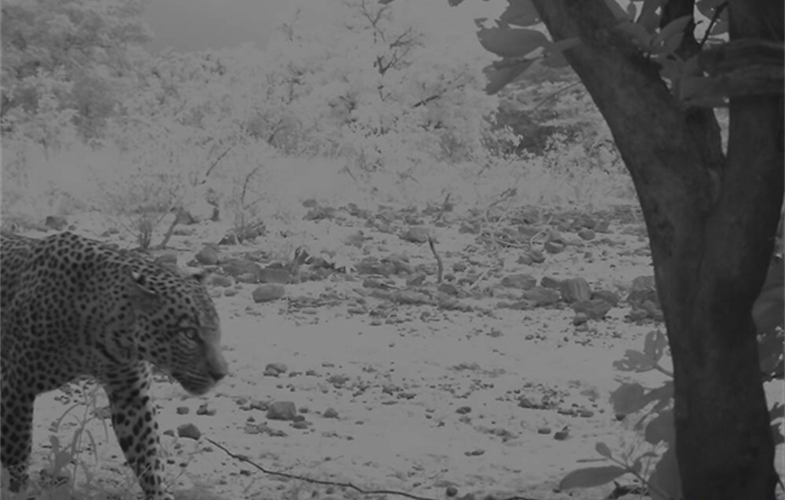CALABAR, Nigeria (October 2, 2017) – Camera traps set up by researchers from WCS (Wildlife Conservation Society) in the forests of Nigeria’s Yankari Game Reserve have captured images of a leopard, an elusive big cat thought to be locally extinct in the region.
 |
| Image of the adult leopard captured by the camera |
Images of an adult leopard—taken automatically by the animal tripping the camera trap’s infrared detector—recently confirmed the presence of the species in Yankari. It is believed that leopards can persist in low numbers across more territory than previously thought. Camera traps are an increasingly common and effective tool used by conservation biologists to survey rare species that would otherwise be extremely difficult to see.
“We are thrilled to have this photographic evidence confirming the persistence of leopards in Yankari Game Reserve,” said Andrew Dunn, Director of WCS’s Nigeria Country Program. “Provided that there is sufficient prey available, leopards can survive in places where other animals cannot. Leopards are usually only active at night in this region, so we believe that it is likely that a small number of leopards have existed all along in Yankari, but have simply escaped observation until now.”
Once widespread across the whole of Nigeria including rainforest and savanna, leopards are threatened by habitat loss, loss of prey, and the illegal wildlife trade. Today leopard are restricted to a few protected areas of Nigeria such as Kainji Lake National Park and Gashaka-Gumti National Park as well as Yankari Game Reserve. Leopard have been heavily persecuted in Nigeria for their beautiful skins, highly-prized for traditional purposes and ceremonies.
“Leopard have not been seen in Yankari for thirty years, so this is a really exciting observation,” said Engr. Habu Mamman, Sole Administrator of Yankari Game Reserve and Resort. “The confirmation of leopards is an immense source of pride for Bauchi State and further enhances Yankari’s reputation as the foremost tourism destination in Nigeria.”
WCS supports management of the Yankari Game Reserve in partnership with the Bauchi State Government. The reserve contains one of the largest remaining elephant populations in West Africa and one of only two lion populations left in Nigeria.
As Nigeria’s human population expands at one of the fastest rates in the world, habitat for wildlife species is disappearing. Fortunately there are still some important wilderness areas left in the country such as Yankari Game Reserve where animals such as elephants and lions can flourish, and where a viable tourism industry can provide benefits to local people.
“We will ensure that leopards and lions, along with elephants and other key species of the Yankari ecosystem, are fully protected and that the populations are allowed to grow,” said Nachamada Geoffrey, WCS’s Landscape Director in Yankari Game Reserve. “We will further strengthen our anti-poaching patrols and will continue our work with surrounding communities to raise levels of awareness. We will also expand our camera trapping program to achieve a better understanding of the leopard population in Yankari. Although the trade in leopard skins is banned in Nigeria, these laws are rarely enforced and leopard skins are still seen openly displayed for sale. We call on NESREA (National Environmental Standards and Regulations Enforcement Agency) and all concerned law enforcement agencies to halt the illegal trade in leopard skins in Nigeria.”
WCS co-manages the Yankari Game Reserve with the Bauchi State Government, and the 96 Elephants campaign provides both funding and support for anti-poaching efforts in the reserve in the form of equipment and training.
 |
| imag |













mind blowing
ReplyDeleteBreathtaking, keep it up bruv
ReplyDelete